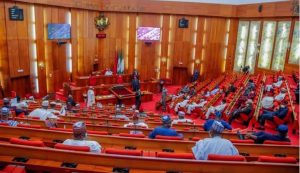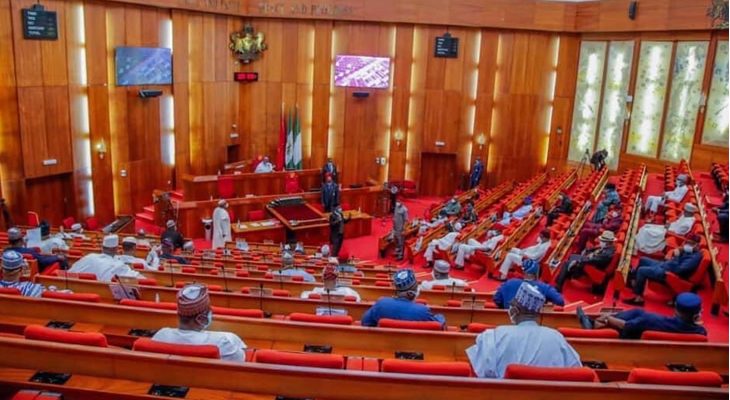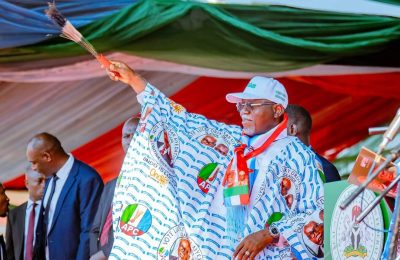
Last week, this column warned Nigerians to expect our legislators to manoeuver and scuttle the introduction of technology into Nigeria’s voting system. The reasoning for the warning was that it would almost amount to suicide for politicians to welcome reforms that can eliminate rigging which is a strategy many of them depend upon.

In truth, many politicians, senators inclusive, were never truly elected into their political positions. As the performance of the senate last Thursday showed, 52 senators voted in favour of an electoral system that is easy to manipulate while some others did not have the courage to be in attendance.
Interestingly, because of the high level of awareness created for the amendment of the electoral act to allow for the introduction of electronic transmission of election results, almost every Nigerian citizen was part of the proceedings of the National Assembly concerning the subject. Yet, 28 senators supposedly elected to represent their people were missing in action when it mattered the most. What a time to be absent!
In fairness, we can on the basis of character evidence, imagine that Ike Ekweremadu former Deputy Senate President who was away at an international conference during the period would have been on the side of the people if he was around.

It is also possible that some of the absentees were similarly away for some cogent reasons. But all those who preferred other assignments to law making at this crucial time ought to be made by their people to account for their absence. We feel many were absent because they believed they could get away with it.
First, Nigerians can hardly unite to resort to the recall principle which the constitution offers for removing non-performing elected persons. Second, the senate had confessed earlier that the recall principle had become ineffective because the provision had been secretly altered without public knowledge.
My friends who had disagreed with my conclusion that the senate would never vote differently on the subject have since sent me several messages to give them hints on why I was so accurate about the behaviour of the senate. Although the messages I got were much fewer than the number the Senate President Ahmed Lawan said he got, I was surprised that my friends didn’t see the obvious signs.
From the body language of our legislators, it was apparent that it was at the senate end that the provision which damaged the great work done at committee level was secretly inserted. This explains why this piece makes no reference to proceedings at the House of Representatives.
The disposition and countenance of Kabiru Gaya, chairman, senate committee on electoral matters, illuminated the path through which the controversy was travelling. His television appearances on the subject during the week were marked by double negatives, quite distinct from his well-known forthright diction over the years. When a person who should say “I know” ends up with “Actually, I am not unaware” one must critically examine the lines behind the words otherwise the truth may never come out.
Such circumlocution was also depicted by many senators. For example, if the argument that the country lacked sufficient internet coverage was the true reason which informed the voting, one would have expected senators from states with such problems to have led the posturing. Rather, it was quite interesting to see senators from a place like Lagos that is saturated by internet coverage voting against its use.
Fortunately, the incongruity helped Nigerians to decipher those against the people.
The argument that people voted along party lines is even more dangerous because such senators are the ones unwittingly identifying the party that is anti-people. From 1999 when democracy was restored to Nigeria till now, international observers had said severally that collation of election results is the devil in our electoral system.
Former President Jimmy Carter who led the monitors in 1999, retorted that there was apparent disparity between the number of voters observed at polling stations and results that were eventually released. Politicians who have decamped from one party to the other (and they are many) are quite conversant with how elections have been won and lost by different parties since 1999, through manipulation of results.
Only last year, we saw a hitch-free and credible election in Edo state only because of the introduction of an INEC portal which showed results real time making it hard for them to be changed. Why will well-meaning citizens object to what can alter the trend of fake election results in our country?
To think that the scheme to stop the nation from getting out of the dilemma could come from the National Assembly is baffling. More inexplicable is the posture of federal legislators that law-making includes taking away from an institution such as INEC, the express provisions of the constitution which give her unambiguous powers to undertake specific functions.
There are three salient points aptly articulated by the Sokoto governor, Rt. Hon. Aminu Waziri- a former admirable Speaker of the House of Representatives: i) The registration of voters and the conduct of election are constitutionally subjected to the direction and supervision of INEC; ii) INEC is the only body that has power to undertake and supervise all elections and iii) INEC Operations are constitutionally disallowed to be subjected to the direction and supervision of any other body or authority.
It is therefore illegal for the National Assembly under the guise of law-making to seek to direct or supervise the electoral body. It is shoddier that the legislators are asking INEC to be answerable either to themselves or to the National Communication Commission NCC – an inferior body to INEC which is a creation of the constitution.
The senate cannot claim to be ignorant that it has no powers to direct INEC. It is only doing so in furtherance of illegal territorial gains or merely testing the waters, knowing full well that consecutive leaders of INEC had been tactful and cool-headed with them so that INEC assignments would not fail under any of them.
Here, INEC is patently wrong. The commission must come out of its shell and take full control of its mandate because there has never been any iota of doubt that she was established as a truly independent entity. Nothing stops INEC from going to court to ward off interlopers like the National Assembly, more so as the latter has proven more than once that she relishes the acquisition of powers and privileges.
Nigerians have not forgotten how the 8th Senate, attempted in vain to usurp the power of INEC to determine the order of elections in the country. Except INEC remains strong and viable and uses all legal means to put away gatecrashers from its jurisdiction, she cannot claim to have ensured the strengthening of democracy from her end.
The original title for this article was: At last, Senate drops INEC’s independence, but just before publication, I realized that someone needs to tell our legislators that taking away INEC’s powers granted by the constitution is criminal as it amounts to stealing from her.
The only way they are allowed to remove any powers from INEC is to first engage in the futility of amending the relevant enabling provisions of the constitution. Our legislators must therefore allow the electoral body to do her work; otherwise, we shall continue in Nigeria to see the perverse arrangement in which legislators who are ordinary players in the game of elections are the ones directing the referee of the game.
Reach the right people at the right time with Nationnewslead. Try and advertise any kind of your business to users online today.
Kindly contact us for your advert or publication @ Nationnewslead@gmail.com Call or Whatsapp: 08168544205, 07055577376







